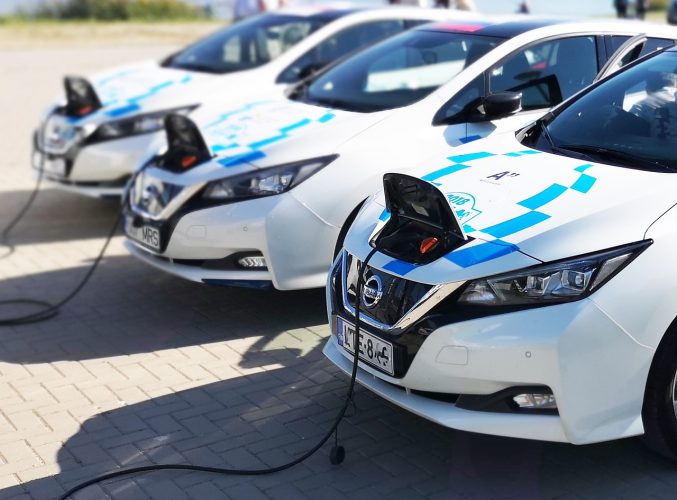Guest Blog: Making EVs Accessible – EV Charging Solutions

This website uses cookies to ensure you get the best experience on our website. cookie information

This guest blog post has been written by John Ellmore from Electric Car Guide. If you’d be interested in writing a blog for us, get in touch with Amy at Liftshare HQ.
Lift-sharing helps take cars off the road, cutting harmful emissions. Even more so if you’re sharing in an EV. Sign-up to Liftshare to start your sharing journey.
However, without an efficient charging infrastructure, even the most advanced electric vehicles can’t realise their full potential.
This article explores types and speeds of EV chargers and where to find them; workplace charging benefits and financial support; as well as what new tech is set to come for EV charging.
As of July 2023, Zap-Map has logged 45,737 public charging points in the UK. But, while cities boast a dense network of charging stations, more rural areas still lag behind in infrastructure. Knowing where to find the right type and speed of public charger can be a task for new EV owners.
Home charging units charge EVs right on your driveway or garage, providing the comfort of recharging while you sleep. All new home chargers in the UK are considered ‘Smart’ as they connect to the internet and can be controlled remotely using smartphone apps or other devices.
Users can set a specific time for charging to start or stop, and charge EVs during off-peak hours when electricity demand is lower and often cheaper. If your home is equipped with solar panels, smart chargers can be programmed to charge EVs using this green energy.
The type of chargers you can expect at home are:
These 2.3kW, 3-pin chargers plug straight into your home’s socket and are informally called “granny chargers”. They’re usually the standard charging cable supplied with the car, are portable and don’t require any special installation. Due to their slow charging speed, they are not ideal for regular daily charging, especially for vehicles with large batteries.
Faster than granny chargers, a 7kW charger requires a dedicated circuit and is usually wall-mounted. 7kW chargers offer faster charging times and are suitable for daily use, they can efficiently charge most EVs overnight.
22kW chargers are much faster and can recharge some EVs in just a couple of hours. As a 22kW charger requires a three-phase electricity supply, it can cost more to install than a 7kW charger.
Public charging stations are really important in making EVs a feasible option for the UK, especially for those who might not have access to home charging if they live in a flat or simply can’t afford one.
Here are the main types of public chargers you will find while out and about:
Typically found in community locations like public car parks, supermarkets or retail parks, these are designed for longer-duration charging.
Mainly found in dedicated service stations, rapid chargers can provide an 80% charge in 40-60 minutes, making them ideal for long-distance travellers.
A whopping 350kW makes ultra-rapid chargers capable of hitting 80% charge in 20 minutes. They’re found at locations where drivers need a quick charge to continue their journey, like motorway service stations and dedicated charging hubs.
Many companies are exploring workplace charging solutions to encourage the adoption of EVs, but also position themselves as environmentally-conscious employers, attracting potential talent in a competitive job market.
For employees, the added advantage of charging vehicles during the workday eliminates the need to go and charge the car at lunch or after work. For companies that maintain an EV fleet or run an electric car salary sacrifice scheme, having on-site charging stations provides an operational boost.
Setting up charging stations can come with a sizable initial investment, but the government has introduced initiatives to financially support businesses, such as the Workplace Charging Scheme (WCS). Through the scheme, businesses can receive vouchers that subsidise a significant portion of the set-up costs.
Each voucher issued can cover up to 75% of the overall costs of purchasing and installing a charging station. This translates to a cap of £350 for each charging socket, with businesses able to apply for a maximum of 40 charging stations across all their sites.
If businesses are unsure about finding an OZEV-authorised installer in their vicinity, they can refer to the official list available on the government website.
As the usage of EVs grows in the UK, the way we charge our cars is set to evolve dramatically and even redefine the energy grid. Here’s a glimpse into what awaits:
The batteries in EVs could play a dual role: powering vehicles and acting as mobile energy storage units. With V2G technology, EVs can feed electricity back into the grid during peak demand or store renewable energy when there’s an abundance. This two-way interaction can stabilise grids and provide financial benefits to EV owners.
While today’s rapid chargers can power up a vehicle in under an hour, technologies like solid-state batteries might revolutionise charging speeds – allowing EVs to recharge in around the same time it takes to fill up a tank of petrol.
Imagine driving your EV into a car park space and having it charge without plugging in. Wireless charging is in its developmental stages and will arrive one day!
To truly realise the green potential of EVs, it’s essential to power them with clean energy. Charging stations equipped with solar panels may become the norm.
Ready to try lift-sharing – whether in an EV or combustion engine car? Sign-up to Liftshare and add your journey.
Author Amy Young
on
See how Liftshare can help your organisation